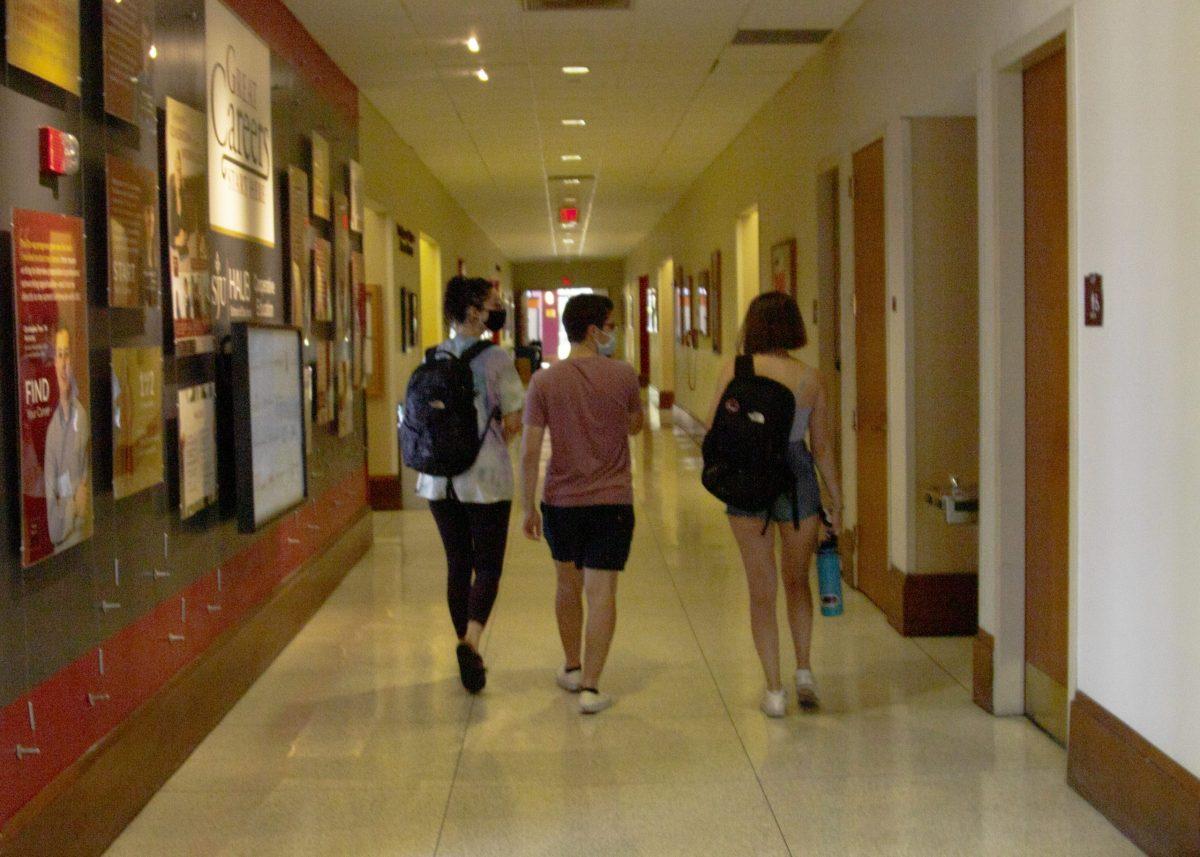As students and faculty move through the third week of fall 2021, students are adjusting to fully on-ground, face-to-face learning after almost one year of online and socially distant classes. For students like Kelly Slater ’24, who went online in March 2020 during her senior year in high school, the transition to in-person was a welcome change from virtual learning.
“It honestly feels different, because this year it’s good to see people in person,” Slater said. “It’s also different to actually start my day 30 minutes before class. I have to get there in person to be there on time.”
Classes began fully in-person on Aug. 23, with all classrooms, labs and event spaces reset to standard capacity this fall according to an Aug. 19 announcement from University President Mark C. Reed, Ed.D. This decision was made due to a high community vaccination rate for students, faculty and staff.
Faculty who had previously taught online for the last two semesters also had to make a transition. Brian Yates, Ph.D., assistant professor of history, said the shift back to fully in-person from all-virtual was a big adjustment.
“I told my students that I haven’t talked to anyone other than my wife or my son face-to-face in more than a year, so please bear with me,” Yates said. “It was hard dealing with different kinds of overstimulation in terms of being in a room with 20 other people. It’s been very, very awkward. I forget how normal that used to be and how abnormal it is now.”
Audre Brokes, Ph.D., associate professor and chair of the philosophy department, said teaching fully in-person was an “unmitigatedly positive” change.
“I’m comfortable with what the university community has adopted,” Brokes said. “I’ve been very clear about the need for us to wear our masks up over our noses at all times and to keep them in place at all times.”
In an email to faculty on Aug. 21, Cheryl McConnell Ph.D., provost and vice president of academic affairs, wrote that “students have been told that HyFlex options are not available in classes this semester and you are not expected to provide such an option.”
This policy was challenged after the historic flooding from Hurricane Ida hit Pennsylvania and other areas of the East Coast on Sept. 1 and 2.
Konstantinos Nikoloutsos, Ph.D., associate professor of classics, said he had to adjust his classes on Sept. 2 because he realised he would not be able to commute to campus.
“I woke up to nearly apocalyptic scenes in Center City, Philadelphia, where I live,” Nikoloutsos said. “It was impossible and dangerous for me to commute to campus. I thought it would be the same for a lot of students.”
Nikoloutsos switched his class to online only after receiving approval via email from James Carter, Ph.D., interim dean of the College of Arts and Sciences, who said that if faculty thought it would be more appropriate or safer to teach online, they could.
“I didn’t want to cancel class, but at the same time I wasn’t sure how many of my students would be able to join over Zoom given the circumstances,” Nikoloutsos said. “So I offered the opportunity to those students who were able to attend class over Zoom, and for those who were not able to Zoom, I opened an opportunity to watch the class at a more convenient, less stressful time.”
For students like Emma Lankin ’23, the flooding on Sept. 2 caused significant complications when trying to commute from Manayunk to campus. Lankin could not attend any of her classes in person that day, so she had to attend via Zoom.
“I had my anatomy lab, but I couldn’t make it and they didn’t have a Zoom for it,” Lankin said. “So, they said if you couldn’t make it on Thursday, they’d have a class on Friday that we could go to, but I had another class during that [time]. I couldn’t attend that one either, so then they recorded it [on Zoom].”
Lankin said she was surprised classes were not cancelled due to commuters being unable to attend, but she thought holding classes over Zoom was necessary if the university was not going to cancel classes.
“I think having the option is good and beneficial because sometimes you just can’t make it to class, and then if they [the university] don’t cancel, then there’s just no way you can make it,” Lankin said. “Especially if it’s for flooding or weather.”
Although not directly affected by flooding, Slater said the move to fully in-person instruction with no option for online raised logistical challenges for students.
“I live in Pennbrook right now and I don’t have a car, and the shuttle isn’t always reliable,” Slater said. “Even if I was sick or something, I know some of my classes don’t even have the option to attend class on Zoom if you can’t make it that day.”
Slater said that Zoom was very helpful in her first year and that she thought the university was going to continue offering classes over Zoom to help students with absences.
“It’s weird how it is just gone now, I do wish Zoom was still a thing,” Slater said. “I’m very grateful to be back in classes in person, but sometimes it would just be more convenient to be on Zoom.”
In her Aug. 21 email to faculty, McConnell said the offices of the provost and president received complaints in the 2020 academic year from both students and parents about faculty members independently moving classes from face-to-face to virtual instruction.
“Some faculty members independently did this last year, even taking a student ‘vote,’” McConnell wrote. “This is not appropriate because of the power dynamic involved in a faculty-student relationship. All such situations were reversed.”





































